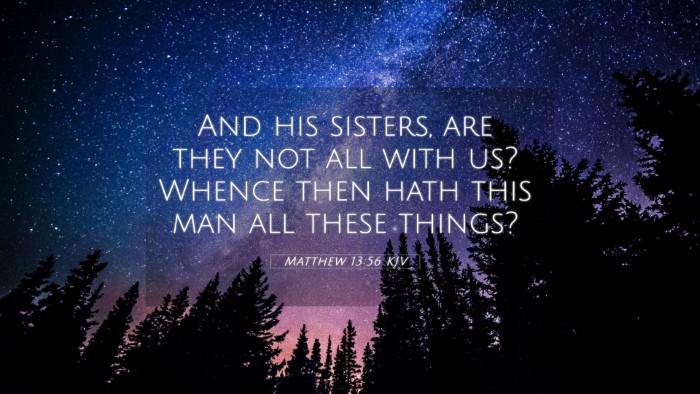Meaning and Interpretation of Matthew 13:56
Matthew 13:56 states, "And His sisters, are they not all with us? Whence then hath this man all these things?" This verse brings to light the skepticism faced by Jesus from His own townsfolk, particularly regarding His wisdom and miraculous works.
Contextual Understanding
This passage is situated in a profound narrative where Jesus returns to His hometown of Nazareth after performing many miracles and teaching profound truths. Instead of receiving Him with honor, the people express disbelief and confusion about Jesus’ authority, given His humble origins.
- Hometown Rejection: Disbelief arises from familiarity. The townspeople could not reconcile the remarkable teachings of Jesus with the boy they grew up with.
- Call to Discipleship: This moment foreshadows the broader narrative of rejection faced by the Gospel, even from those who are closest to it.
- Sister's Reference: The mention of Jesus' sisters is significant, revealing His human ties and illustrating the ordinary setting from which extraordinary events were unfolding.
Commentary Insights
Matthew Henry's Commentary
Matthew Henry emphasizes the theme of familiarity breeding contempt. He notes how Jesus’ kin, rather than acknowledging His divine calling, point to their personal history with Him, questioning His authority. Henry posits that people's disbelief stems from a mistaken view of the humble beginnings in which Jesus was raised.
Albert Barnes' Commentary
Albert Barnes highlights the irony present in the townspeople's remarks. The rhetorical question posed illustrates a profound disconnect; the people fail to grasp that the power of Jesus does not derive from earthly credentials. Barnes further elaborates that this rejection serves a dual purpose, illustrating the fulfillment of prophecy regarding the Messiah being scorned and providing a broader lesson on faith amidst doubt.
Adam Clarke's Commentary
Adam Clarke suggests that the reference to Jesus' siblings signifies the ordinary family life of Jesus. His remarks indicate that those who are closest to Him often display the greatest skepticism; they ask "Where, then, did this man get these things?" This portrayal contrasts their limited understanding with the vastness of Christ’s divine wisdom.
Bible Verse Cross-References
There are several important Bible verses that parallel and relate to Matthew 13:56, offering deeper understanding and connections:
- Matthew 13:54: "And when He was come into His own country, He taught them in their synagogue." This verse sets the stage for the skepticism expressed in 13:56.
- John 1:46: "Nathanael said to him, Can there any good thing come out of Nazareth?" This reflects the prejudice against Jesus’ origins.
- Mark 6:4: "But Jesus said unto them, A prophet is not without honor, but in his own country." This repeats the theme of rejection within familiar settings.
- Luke 4:24: "And He said, Verily I say unto you, No prophet is accepted in his own country." Here, Jesus speaks to the expectation of rejection among His own.
- Matthew 12:46-50: This passage discusses Jesus’ relationship with His family and those who do the will of His Father being His true family.
- John 7:5: "For neither did His brethren believe in Him." This highlights the lack of faith among those closest to Him.
- Isaiah 53:3: "He is despised and rejected of men; a man of sorrows, and acquainted with grief." A prophetic scripture that speaks to the nature of Jesus’ acceptance among people.
Thematic Bible Verse Connections
Matthew 13:56 can be understood within broader themes throughout the Scriptures. The connections include:
- Faith vs. Doubt: This verse showcases the tension between faith and skepticism present throughout the biblical narrative.
- Suffering Servant Theme: Reflects Jesus’ messianic role as prophesized in Isaiah, emphasizing rejection leading to divine purpose.
- Family and Discipleship: Highlights the challenges faced in relationships when one is called to a significant mission.
Conclusion
In examining Matthew 13:56, it is evident that this verse encapsulates a critical moment of rejection and disbelief. The reflections from notable public domain commentaries provide layers of interpretation that enhance our understanding of Jesus' earthly ministry. Additionally, the suggested biblical cross-references and thematic connections deepen the discourse on how familiarity can often cloud recognition of divine wisdom and authority.


